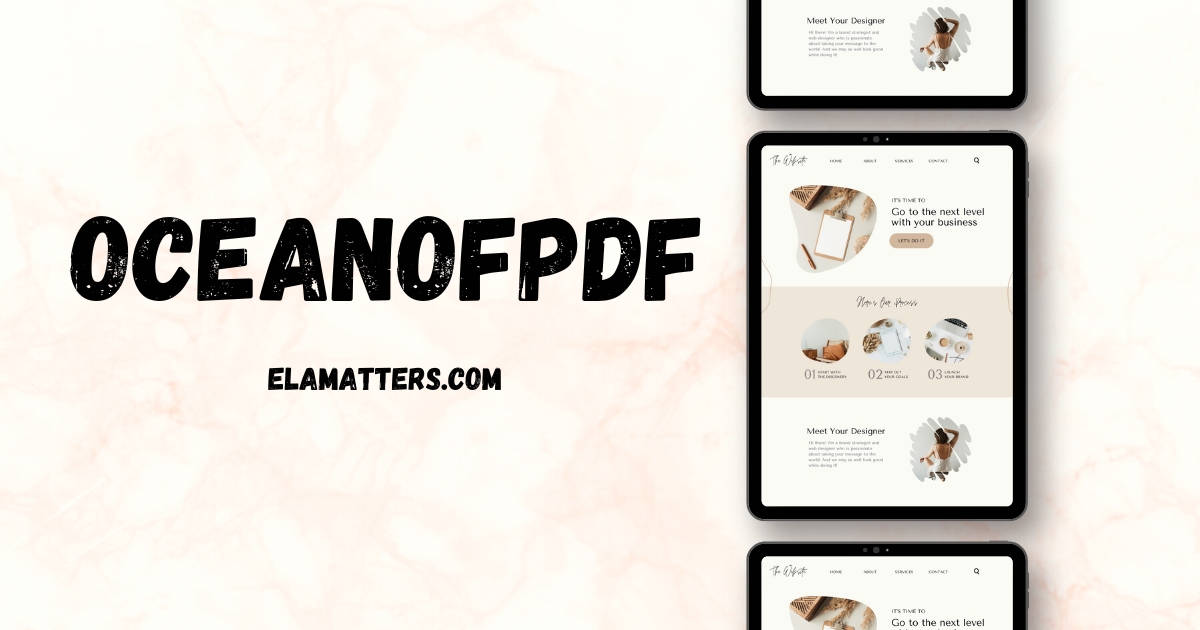In the vast ocean of digital content, few sites have generated as much buzz—and controversy—as OceanofPDF. Launched with the promise of providing access to thousands of ebooks for free, it quickly became a go-to resource for avid readers and students alike. But behind its enticing offerings lies a tumultuous saga marked by legal battles and ethical dilemmas. As we dive into the rise and fall of OceanofPDF, we’ll explore how it captured the hearts (and screens) of many while also igniting fierce debates about copyright laws in the digital age. Grab your virtual life jacket; this journey is anything but smooth sailing!
Rise of OceanofPDF and its Popularity
OceanofPDF quickly gained traction among ebook enthusiasts when it launched. Users were drawn to its vast collection of free downloadable ebooks across various genres. The platform boasted an extensive library that catered to readers’ diverse tastes.
Word spread through online forums and social media, fueling its popularity. Many users praised the site for providing access to academic texts and popular bestsellers alike. It became a go-to source for students and casual readers seeking budget-friendly options.
The user-friendly interface made navigating the site easy, contributing to its rapid growth. OceanofPDF’s allure lay in its promise of limitless reading material without financial barriers. This appeal resonated with countless individuals looking for alternatives to traditional bookstores or subscription services.
As more people flocked to the site, it solidified itself as a prominent player in the digital book-sharing landscape. This rise marked a significant moment in how we consume literature today.
Controversies Surrounding the Site
OceanofPDF has long been a lightning rod for controversy in the digital publishing world. Critics argue that it showcases an extensive library of pirated ebooks, infringing on copyright laws while undermining authors’ rights.
Users flocked to the site for free access to otherwise expensive literature. This allure raised ethical questions about the value of intellectual property and fair compensation for creators. Many authors reported significant losses as their works were freely distributed without consent or financial reward.
Additionally, OceanofPDF faced accusations regarding its business model. The website’s operations often included ad revenue generated from high traffic volumes, leading some to question whether profit was prioritized over supporting writers and publishers.
These controversies surrounding OceanofPDF stirred heated debates within both literary circles and legal frameworks, igniting discussions on how society values knowledge versus ownership in our increasingly digital age.
Legal Actions Against OceanofPDF
Legal battles loomed large over OceanofPDF as publishers and authors clamored for justice. Major publishing houses accused the site of facilitating copyright infringement on a massive scale.
In response to these claims, several lawsuits were launched, aiming to hold the operators accountable for their actions. The stakes were high; millions in potential revenue were lost due to rampant piracy.
Law enforcement agencies also took notice, intensifying pressure on internet service providers and hosting platforms associated with OceanofPDF. This led to increased scrutiny and investigations into its operations.
Despite its popularity among users seeking free ebooks, legal challenges painted a different picture—a precarious future filled with uncertainty. As authorities closed in, the walls began to close around this controversial platform.
The Shutdown of OceanofPDF
The shutdown of OceanofPDF marked a significant turning point in the world of ebook piracy. Once a go-to site for millions seeking free access to books, it suddenly vanished from the digital landscape.
Users were left frustrated and searching for alternatives. The abrupt closure created ripples throughout online communities that had relied on its vast library.
Many speculated about the motives behind this sudden disappearance. Legal pressures, heightened scrutiny, and an ever-watchful publishing industry likely played pivotal roles in its downfall.
In its absence, forums lit up with discussions about what would come next. Some turned to lesser-known sites while others began exploring legitimate options for accessing ebooks without breaking the law.
The loss of OceanofPDF was felt deeply by both readers and authors alike as conversations around copyright infringement intensified within digital spaces.
Impact on the Ebook Industry
The rise and fall of OceanofPDF has left a significant mark on the ebook industry. While it provided readers with easy access to countless titles, it also ignited fierce debates about copyright infringement.
Authors and publishers felt the sting of lost revenue as more people turned to free downloads instead of purchasing books. This shift disrupted traditional sales models, prompting many in the publishing world to rethink their strategies.
In response, some publishers began offering more affordable options or subscription services. The success of platforms like Kindle Unlimited reflects this trend toward adaptability.
On the other hand, legitimate ebook creators have pushed for stronger digital rights management measures to protect their content from unauthorized distribution.
As the landscape evolves, both consumers and creators must navigate these changes carefully while considering what value books truly hold in a digital age.
Conclusion: The Future of Ebook Piracy and Alternative Sites
The landscape of ebook piracy is constantly evolving. As sites like OceanofPDF rise and fall, users are left searching for alternatives that offer similar access to content without the associated risks. The controversy surrounding such platforms often leads to legal repercussions, which can scare off potential users.
However, demand for free or low-cost ebooks remains strong. This creates an ongoing cycle where new sites regularly emerge to fill the void left by those that shut down. While some may argue this undermines authors and publishers, others see it as a way of democratizing information.
As technology advances, it’s likely we’ll see innovative solutions aimed at balancing accessibility with copyright laws. Subscription services might become more appealing if they can provide value comparable to what was once offered freely through pirated sites. Meanwhile, readers will continue to explore their options in search of affordable literature.
The future holds many possibilities for both ebook piracy and legitimate avenues for reading digital books. It’s a dynamic space worth keeping an eye on as trends shift and new players enter the market.

